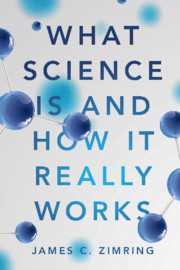Introduction
Published online by Cambridge University Press: 04 July 2019
Summary
The terms “science” and “scientific” have come to have a special meaning and to carry a special weight in modern society. Professional scientists tell us that genetically modified foods are safe to eat, that industrial emissions are causing global warming, that vaccines don’t cause autism, and that some medications are safe and effective while others are not. A consumer product seems more trustworthy if it’s described as “scientifically proven” or if “clinical studies have demonstrated its effectiveness.” Politicians and lobbyists often evoke “scientific proof” in arguing for certain positions or policies. Our federal government invests taxpayer dollars in “scientific research” of different varieties. Whether something can be categorized as “science” determines if we allow it to be taught in our public school science curricula, as in the ongoing debate over teaching evolution vs. intelligent design theory.
- Type
- Chapter
- Information
- What Science Is and How It Really Works , pp. 1 - 16Publisher: Cambridge University PressPrint publication year: 2019



